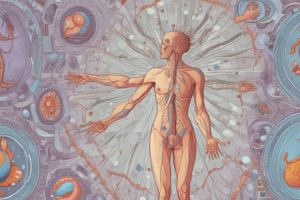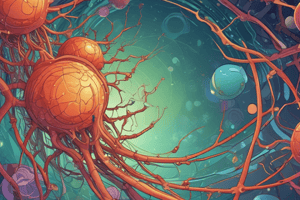Podcast
Questions and Answers
What is a key outcome recognized in the history of immunology?
What is a key outcome recognized in the history of immunology?
- Advancements in modern vaccines (correct)
- Establishment of chemotherapy protocols
- Development of surgical techniques
- Discovery of antibiotics
Which milestone is most directly related to the development of vaccines?
Which milestone is most directly related to the development of vaccines?
- Emergence of germ theory (correct)
- Discovery of anesthesia
- Invention of microscope technology
- Identification of viral structures
Which event is associated with the early practices of immunization?
Which event is associated with the early practices of immunization?
- Edward Jenner's smallpox vaccine (correct)
- Robert Koch’s bacteriological discoveries
- Louis Pasteur's rabies treatment
- Vaccination campaigns in World War I
What did the historical advancements in immunology primarily contribute to?
What did the historical advancements in immunology primarily contribute to?
Which significant figure is often credited with laying the foundation for vaccination?
Which significant figure is often credited with laying the foundation for vaccination?
What significant observation did Thucydides make regarding the Athenian plague?
What significant observation did Thucydides make regarding the Athenian plague?
In what year did Thucydides observe the principles surrounding infection during the Athenian plague?
In what year did Thucydides observe the principles surrounding infection during the Athenian plague?
Which principle did Thucydides emphasize in his observations about the Athenian plague?
Which principle did Thucydides emphasize in his observations about the Athenian plague?
What was Thucydides' role during the Athenian plague?
What was Thucydides' role during the Athenian plague?
What aspect of immunology can be derived from Thucydides' observations?
What aspect of immunology can be derived from Thucydides' observations?
Flashcards are hidden until you start studying
Study Notes
Historical Milestones in Immunology
- Thucydides (430 BC) recognized the link between plague survivors and immunity to reinfection.
- Early observations laid the groundwork for understanding infectious disease principles.
Immune System Components
- White Blood Cells: Key players in the immune response, involved in identifying and combating pathogens.
- Molecules: Include both soluble (antibodies) and non-soluble components (cell membranes) critical for immune function.
Anatomy of the Immune System
- Primary Organs: Bone marrow (produces blood cells) and thymus (matures T-cells) are essential for developing immune responses.
- Secondary Organs: Lymph nodes and spleen play a crucial role in filtering pathogens and activating immune responses.
Adaptive Immunity
- Defined as the immune system's ability to specifically recognize and target pathogens, providing long-term protection through memory.
- Adaptive immunity is crucial for developing vaccines and immune responses to infections.
Clinical Relevance of Immunology
- Vaccination utilizes the principle of immune memory to prevent diseases such as smallpox, polio, and measles, significantly decreasing morbidity and mortality rates.
Studying That Suits You
Use AI to generate personalized quizzes and flashcards to suit your learning preferences.




